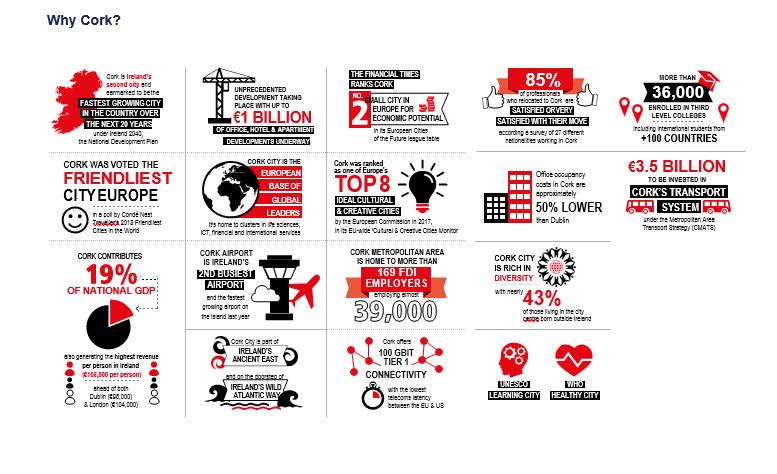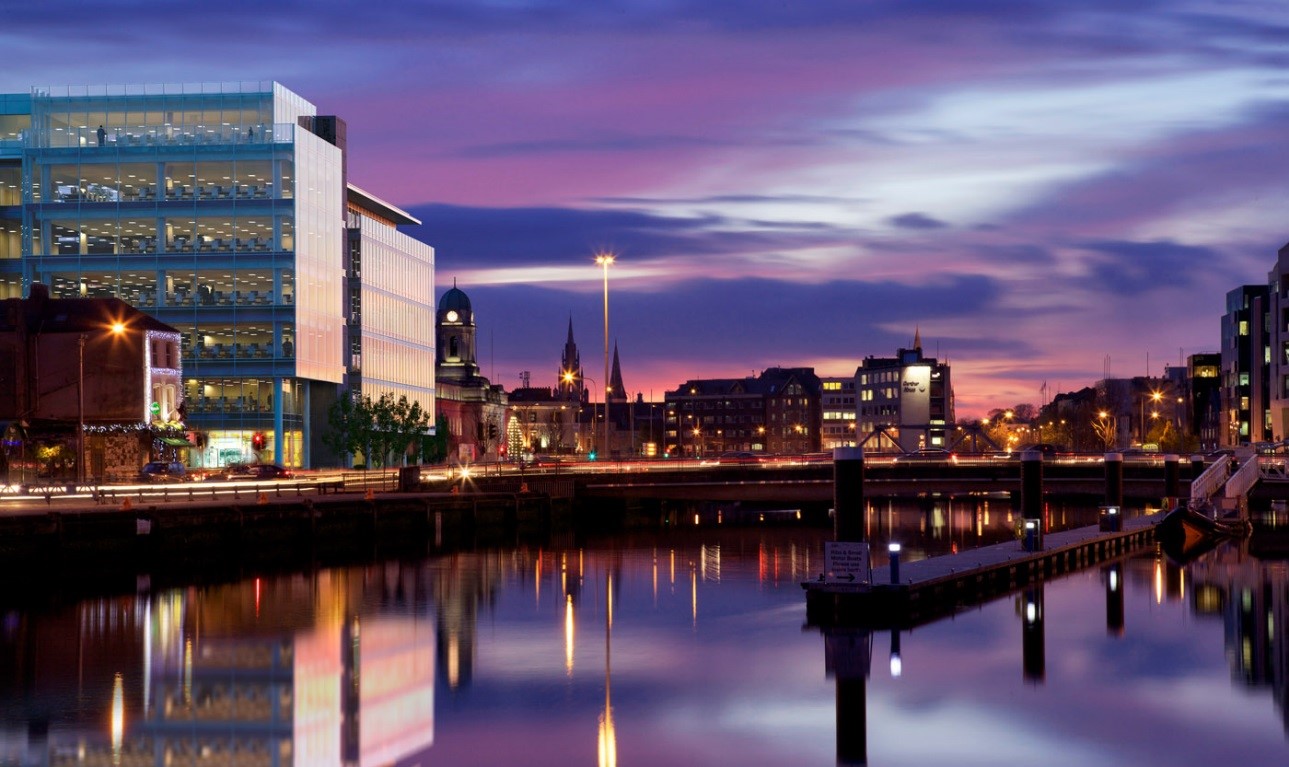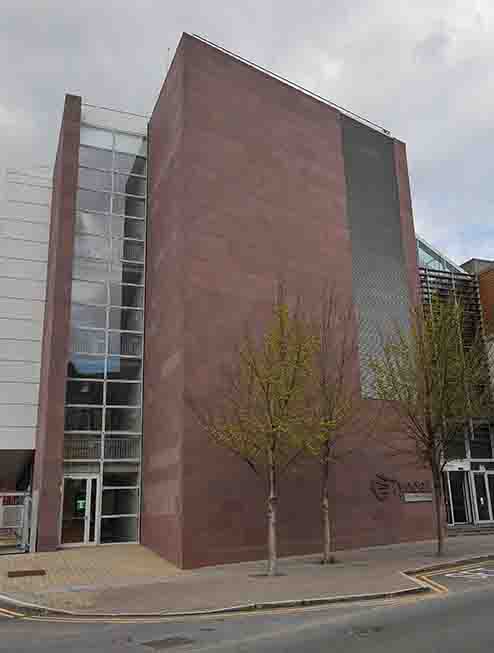7. A Diverse Economy
7.1. Introduction
As Ireland’s second city, Cork plays an important and growing role in the economic success and prosperity of the State. Outside of Dublin, Cork has the highest levels of disposable household incomes and taxation contribution. These are key indicators of a thriving economy and city. For Ireland to be successful, Cork needs to be successful.
As Ireland is a small open economy that is strongly influenced by international trends. When the global economy is rising, Ireland prospers. Over the last 50 years, Ireland has witnessed its share of periods of economic growth and recession; however, the underlying narrative is of a very strong economic growth. Gross Domestic Product (GDP) per capita in Ireland is now amongst the highest in the world. Cork has played a key role in Ireland’s economic success and we strive to ensure that Cork City will continue to act as a driver of the regional and national economy.
While we do not and cannot know the full impact of COVID-19 on the economy, the forecasts and trends that have emerged are stark. We also do not know the nature or speed of the recovery – whether there will be a steep bounce-back or a more prolonged downturn followed by a more gradual upturn. Whatever the case may be, it will be challenging and has recast the conditions in which the City’s development plan will be formulated.
While Ireland, and Cork, is home to some of the top multinational corporations, the SME sector accounts for between 98-99% of enterprises in Ireland 1. The SME sector in Ireland and in Cork will be one of the most exposed to the fallout from COVID-19. Therefore, our collective efforts to support economic development and recovery must ensure that the enterprise and business environment and the support structures available in Cork City are geared towards these small and medium sized companies. We must also ensure that Cork remains one of the most attractive locations in Ireland for FDI and continue to provide the skills, talent and services that draw these vital employers to Cork.
7.2. Trends
Did you know that:
- In Q4, 2019 unemployment in the South West was at an all-time low of 3.7%. This has significantly increased as a result of the COVID 19 virus;
- Cork is a key driver of the national and regional economy and contributes 19% of Ireland’s GDP;
- The Financial Times ranked Cork 2nd small city in Europe for economic potential;
- In Q1, 2020 there were over 39,000 people working in 169 foreign owned companies based in the Cork region. These companies are supported by IDA Ireland;
- Over 2.7million domestic and overseas tourists spent €833million in the Cork region in 2017. Tourism has contracted significantly as a result of COVID 19;
- Over 36,000 students enrolled in third level academic institutions in Cork including University College, Cork (UCC) and Munster Technological University (MTU);
- Enterprise Ireland and the Local Enterprise Office (LEO) works with UCC and MTU to provide a broad range of supports for business start-ups in Cork. There are over 24,000 people working for businesses supported by Enterprise Ireland and the LEO in Cork.
- Retail is the second largest employment sector in Cork City, employing over 10,000 people before the COVID 19 pandemic. Retail is a key component of the vibrancy of the city centre, and a key employer throughout the city, in particular Mahon, Ballyvolane, Wilton, Douglas and Ballincollig.
7.3. Key Challenges for Cork City Development Plan
- The level of footfall in Cork City Centre has been increasing prior to the COVID-19 health emergency. That said, retailers face the considerable challenge of competing with online retail. Plans are in place to improve the experience offered to shoppers in the City Centre, towns, villages and suburbs of Cork. This will involve improvement of the public realm, development of the cultural offering, and evolution of the retail, cafés, bars and restaurants offering in Cork, all of which should combine to enhance the vibrancy and viability of the city centre and our key centres. We must also continue to support our retailers so that they can be equipped and enabled to make the best use of emerging technology and to create a seamless combined store and online experience.
- The success of Cork’s economy in recent years is well documented as outlined above. However, we are in a time of unprecedented technological change. Businesses in the city must innovate to ensure that they can continue to compete globally. The research, development and innovation ecosystem of the city is being enhanced by businesses, academia, cluster organisations, IDA Ireland, Enterprise Ireland and the Local Enterprise Office.
- Cork’s economic strategy must make sure that the benefits of economic development are spread to all areas across the city and that it translates into job opportunities for all sectors of society. We need to create a broad range of types of jobs with varying skills in areas throughout the City. Key sectors such as ICT, pharma, manufacturing, financial services, professional services, and international services are driving the city’s economy. In addition many people are working in in retail, tourism, arts and culture, catering and associated support services. It will be important to ensure that a broad range of employment opportunities are created and sustained in the city.
- People work in a range of business types located throughout the city. This includes a mix of office, commercial and retail space along with sites that are suitable for light manufacturing and local services. Some of the sites that have acted as traditional employment zones throughout the city are in need of regeneration and improvement. It will be important to get the right mix of zoning and property solutions, the correct regeneration or reuse of existing industrial and employment zones, such as Cork Docklands, and a suitable spread of employment areas to enhance sustainable transport and provide job opportunities in local areas.
- High intensity office uses are best located in areas with sustainable transport options. In the last decade officebased employment has been increasingly attracted to the City Centre, which is the location with greatest transport choice available and with expansion potential into City Docklands. Other lower intensity employment uses with high space needs may be more suited to less central locations. The City Development Plan will aim to provide for the expansion in employment identified in RSES through designation of a range of suitable employment locations. There will be new types of jobs that do not exist today. We are living in an era of accelerating technological change. Throughout history, technological advancement has made some skills redundant, while creating opportunities for new skills. Cork’s labour force has proven to be agile in the past, and has moved from heavy manufacturing to services, and high value manufacturing sectors. This involved a period of improved education opportunities, continuous skills development, training, research and innovation. It is important that the city has a mix of primary and secondary schools throughout Cork. In addition we will need to accommodate the expansion of the Education and Training Board, University College Cork and Munster Technological University, along with other training, research and education institutions, to ensure that we have the infrastructure required to continue to build the skills and education capacity of the city.
- The economic value of our culture and heritage is increasingly valued. It is an economic driver in itself, and helps to Cork win further investment by improving the attractiveness of the city as a place to live and visit. Cork enjoys a wealth of heritage assets and cultural amenities, such as the Crawford Art Gallery, the Opera House, The Triskel, The Everyman, St Finbarr’s Cathedral, The Glucksman Gallery, Shandon, Elizabeth Fort, the Medieval Spine of the City, Blarney Castle and Ballincollig Mills, combined with fine examples of top-class architectural and heritage assets. Cork’s rich heritage further enhances quality of life and attractiveness of the city. These assets need to be protected and to evolve and develop.
- Placemaking is increasingly seen as critical to successful economic development. This means provision of high-quality public services, community and social infrastructure, sustainable and active travel facilities, green spaces, cultural amenities and third level infrastructure is required in parallel with more conventional economic incentives. This will need to be taken account of the new City Development Plan.
- Cork plays a key role in the South-West regional economy. Cork City Council, in partnership with Cork County Council and Kerry County Council is implementing the South-West Regional Enterprise Plan to achieve ambitious economic and enterprise development goals for the region. Capital investment plans including the improvement of the N22, the N20 and the Dunkettle Interchange will result in improved transport connectivity across the region. The establishment of the Munster Technological University will strengthen the academic, research and innovation links between Cork and Kerry. These are designed to enhance the economic competitiveness of the South-West region.
7.4. Key Questions
- What are the short, medium and long term impacts of COVID 19 on Cork City’s economy and how can we return to growth?
- How do we sustain jobs in the services sector with competition from online retail?
- How to we ensure that the city centre and suburbs, towns and villages are vibrant in light of changing retail trends?
- How do we build the resilience of our economy and ensure that there are jobs for people in Cork in the long term as technology changes?
- How do we spread the benefits of economic growth across all sectors of society?
- How can Cork provide the correct property solutions needed to create jobs across the city?
- Which parts of the city do you think would be suitable for designation for offices? For manufacturing?
- How do we plan for jobs that will be made redundant or that do not yet exist as technology changes?
- How do we realise the economic benefit of our rich cultural, heritage and arts assets and sectors?
- How do we ensure that Cork is a driver of the economy of the Southern Region?


